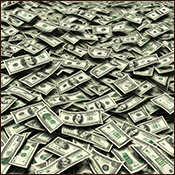Inflation: A Deadly Poison
After my Swedish grandmother died in 1996, my family and I sorted through some of her belongings. We found a few German-language books among her personal effects. Hidden in their dusty pages was a hastily printed Deutsche Mark; I was struck by how crude and jagged the text was. It was my grandmother’s souvenir from Germany’s experience with hyperinflation.
My grandmother went to Germany for her education; on the surface, this was a very strange choice. Her mother, who probably was bipolar, insisted. The Allies had recently defeated Germany in the First World War. Her school was unpleasant. My grandmother once recounted the harrowing tale of how her inflamed tonsils were removed. They were extracted without anaesthetic; she was awake for the entire ordeal. Soon afterward, her father brought her home, much against the wishes of her mother.
I never got to talk to her extensively about this period in her life; she seemed inclined to forget. However, she did remember the hyperinflation of post World War One Germany and how insane things became.
As part of the Treaty of Versailles, Germany agreed to pay heavy reparations to the Allies; this completely destroyed the German budget. In order to pay its bills, the government literally printed money. As this money had nothing behind it except the empty promises of a discredited government, it rapidly lost value. Once you start down this path, it’s difficult to stop: the government kept printing money, and more money kept on chasing the same amount of goods. As the British museum curator Neil MacGregor stated, sometimes police caught counterfeiters because their notes were better than the ones the government produced.
Eventually Hjalmar Schacht, a new finance minister, brought the situation under control. He created a new currency called the Rentenmark, backed by properties owned by the government. Schacht was no hero: he eventually became finance minister for Hitler’s regime. American loans via the Dawes plan also helped stabilise the situation. However, the experience of hyperinflation wounded German national pride; this added fuel to the fires which would eventually spread across Europe. After the war, the Bundesbank made controlling inflation a top priority. This is still part of the European Central Bank’s DNA.
Inflation kills governments: it felled Jimmy Carter’s Presidency. He didn’t win a second term. Inflation plagued the British to the extent they were willing to embark on a radical monetarist experiment with Margaret Thatcher in 1979.
While the present situation in America is nowhere near as bad as it was in the Seventies, and it is vast distance from the German experience, nevertheless, prices are signficantly higher than they were prior to the pandemic. There are a number of causes: the pandemic exposed weaknesses in the supply chain. Russia’s invasion of Ukraine disrupted energy supplies and agricultural production. While the rate of inflation has slowed, it has not gone into reverse.
President Biden faces many challenges to secure re-election. Many Democrats wonder why people aren’t happier, after all, America’s rate of inflation is much lower than other countries. Unemployment is low. The stock market is booming. Wages are finally catching up. However, if the price of food does not reverse to its pre-pandemic levels, it is difficult to see anything other than a decline in the standard of living. Inflation makes saving seem like a fool’s errand, particularly with the low interest rates the banks currently pay. Inflation erodes any sense of stability.
Not all of this is Biden’s fault, nor under his control. The Federal Reserve sets interest rates, not the President; it does so based on its independent judgement. Biden can influence events abroad but not control them. The Founding Fathers may have done the country a disservice by making the President both the Head of State as well as the Head of Government. Many nations, including Germany, have separated the roles so that the Head of State is there to unify the nation around symbols and messages, and the Head of Government is there to do the dirty work. Combining these roles may have elevated the President to a level of perception that it does not merit. He is not a God King, yet if the land prospers, we attribute it to works by his hand, similarly if the land bleeds, we ferociously blame him.
Inflation is not the only major election issue. However, elections now are won or lost due to fine margins. Biden may have difficulties because inflation has had this pernicious, poisonous effect. While Biden has mitigated the issue with the Inflation Reduction Act, it has not gone away, nor has it been forgotten. Memories of inflation persist in the collective consciousness as the Germans have shown.
Biden should address the issue head on. He should say that though he and the Democrats have done much, there is still much to do. A dysfunctional Republican House can achieve nothing. He needs to access a Bill Clinton theme and show that he feels the pain of the American people, particularly those in the heartland who feel the squeeze on wages most acutely. Trump has no answer to this issue either, apart from suggesting drilling for oil will reduce the cost of energy; that is not sufficient. Biden has better and wiser advisors; they should own the economy as an issue and hammer home their advantage.
At the moment, however, this is not happening. I don’t know if it’s due to a lack of sharp communications or perception. Either way, the election will remain a tense, nervous affair. Neither defeat nor victory are certain. That’s too bad because given the quality of the opposition, Biden should be romping home.



